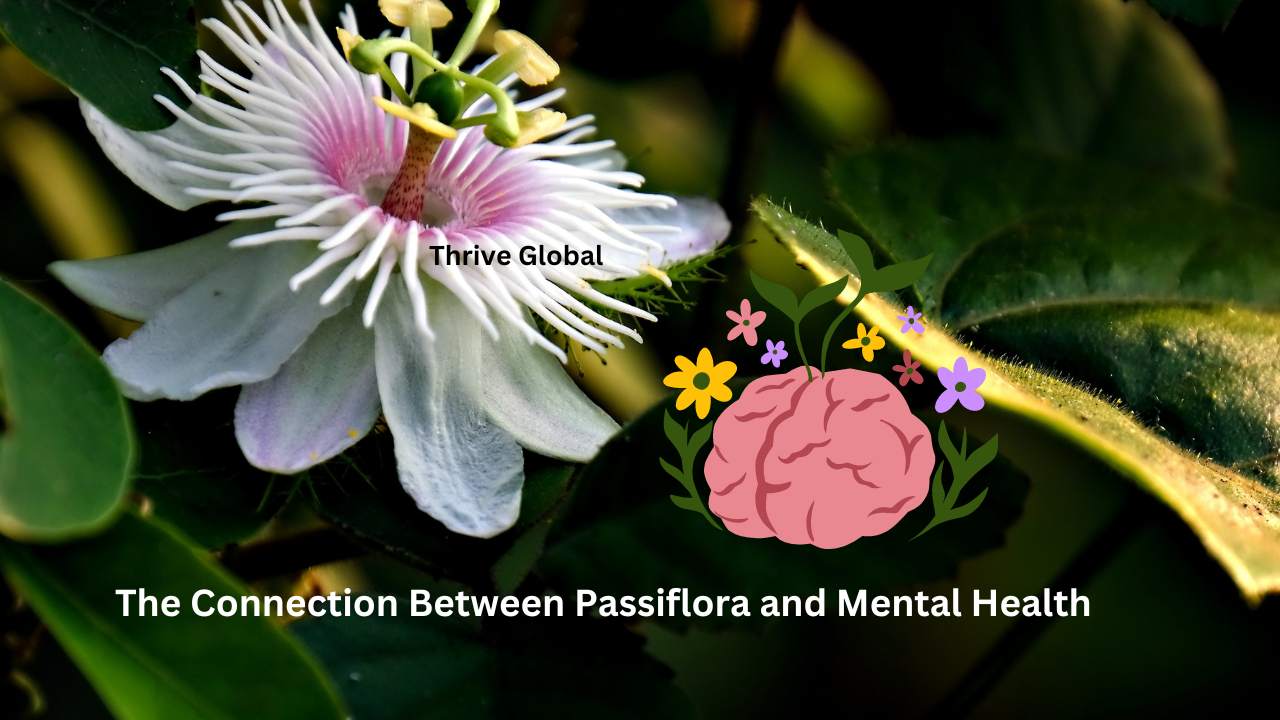Mental health is a cornerstone of overall well-being, influencing how we think, feel, and interact with the world. Among the various natural remedies being explored for mental health support, Passiflora, commonly known as passionflower, has gained significant attention. So, know the profound impact of Passiflora on mental health, exploring its benefits, scientific backing, and practical uses.
What is Passiflora
Passiflora is a genus of flowering plants known for their strikingly beautiful and intricate blooms. Native to the Americas, these plants have been used for centuries in traditional medicine. The most commonly used species for medicinal purposes is Passiflora incarnata, also known as the maypop. This plant has a rich history of use by Native Americans and later by European settlers, primarily for its calming and sedative properties.
The Active Compounds in Passiflora
The effectiveness of Passiflora in promoting mental health can be attributed to its diverse array of active compounds. These include flavonoids, alkaloids, and glycosides, which interact with the central nervous system to produce calming effects. The primary active compounds are vitexin, isovitexin, and chrysin, all of which contribute to its anxiolytic and sedative properties.
Passiflora for Anxiety Relief
Anxiety disorders are among the most common mental health issues, affecting millions worldwide. Passiflora has been traditionally used to alleviate symptoms of anxiety. Modern research supports this use, indicating that Passiflora can reduce anxiety levels in various populations. Studies have shown that Passiflora extract is as effective as conventional anxiolytic medications, such as benzodiazepines, but with fewer side effects.
Enhancing Sleep Quality with Passiflora
Good sleep is essential for mental health. Passiflora has been used to treat insomnia and improve sleep quality. The plant’s sedative properties help to induce sleep and enhance its quality, making it a popular natural remedy for those struggling with sleep disorders. Research has demonstrated that Passiflora can increase total sleep time and improve sleep efficiency, contributing to overall better mental health.
Alleviating Stress with Passiflora
Chronic stress is a significant contributor to mental health issues, including anxiety and depression. Passiflora can help mitigate the effects of stress by promoting relaxation and reducing the physiological response to stressors. The calming effect of Passiflora can help lower cortisol levels, the body’s primary stress hormone, thereby reducing the adverse effects of stress on the body and mind.
Also Read: Science Behind G037 An Analytical Approach
Passiflora and Depression
Depression is a complex mental health disorder that can be challenging to treat. While Passiflora is not a cure for depression, it can support treatment by alleviating symptoms such as anxiety and insomnia, which often accompany depression. By improving sleep quality and reducing anxiety, Passiflora can contribute to an overall improvement in mood and well-being.
Passiflora as an Adjunct to Conventional Therapies
Passiflora can be used alongside conventional treatments for mental health conditions. It can enhance the effectiveness of other therapies, such as cognitive-behavioral therapy (CBT) and medication, by providing additional relief from symptoms. This integrative approach can lead to better treatment outcomes and improved quality of life for individuals with mental health issues.
Scientific Evidence Supporting Passiflora
Several studies have investigated the efficacy of Passiflora in treating mental health conditions. For example, a double-blind, randomized controlled trial found that Passiflora extract was effective in reducing anxiety in patients undergoing dental surgery, comparable to the effects of midazolam, a commonly used anxiolytic. Another study demonstrated that Passion flowers extract improved sleep quality in individuals with mild sleep disorders.
Safe Usage and Dosage of Passiflora
When using Passion flowers for mental health, it is crucial to adhere to recommended dosages to avoid potential side effects. The typical dosage of Passion flowers extract ranges from 300 to 500 milligrams per day. It is advisable to start with a lower dose and gradually increase it as needed. Passion flowers is generally considered safe, but it can cause mild side effects such as dizziness, drowsiness, and gastrointestinal issues in some individuals.
Passiflora Tea for Daily Relaxation
One of the simplest ways to incorporate Passiflora into your routine is by drinking Passion flowers tea. This herbal tea can be made by steeping dried Passiflora leaves in hot water for about 10 minutes. Drinking Passion flowers tea before bedtime can help promote relaxation and improve sleep quality. It can also be consumed during the day to alleviate stress and anxiety.
Combining Passiflora with Other Herbs
Passion flowers can be combined with other calming herbs, such as valerian root, lemon balm, and chamomile, to enhance its effects. These combinations can provide synergistic benefits, making them more effective for managing anxiety, stress, and sleep disorders. Herbal blends can be found in various forms, including teas, tinctures, and capsules.
Passiflora in Aromatherapy
Passion flowers essential oil, although less common, can be used in aromatherapy to promote relaxation and mental well-being. Adding a few drops of Passion flowers essential oil to a diffuser can help create a calming environment, reducing stress and anxiety. It can also be used in massage oils for added relaxation benefits.
Passiflora Supplements
Passion flowers supplements are available in various forms, including capsules, tablets, and liquid extracts. These supplements can provide a convenient way to obtain the benefits of Passion flowers, especially for those who do not enjoy herbal teas. When choosing a supplement, it is essential to select a high-quality product from a reputable manufacturer to ensure safety and efficacy.
Potential Interactions with Medications
While Passion flowers is generally safe, it can interact with certain medications, such as sedatives, anticoagulants, and antidepressants. It is crucial to consult a healthcare provider before using Passion flowers, especially if you are taking any prescription medications or have underlying health conditions. This will help prevent potential adverse interactions and ensure safe usage.
Passion flowers and Lifestyle Changes
Incorporating Passion flowers into a holistic approach to mental health can yield the best results. Combining Passion flowers with healthy lifestyle changes, such as regular exercise, a balanced diet, mindfulness practices, and adequate sleep, can enhance its benefits. This integrative approach can help promote overall mental well-being and improve quality of life.
Personal Experiences with Passion flowers
Many individuals have reported positive experiences with Passion flowers for mental health support. Personal anecdotes highlight its effectiveness in reducing anxiety, improving sleep, and promoting relaxation. While individual experiences can vary, these testimonials underscore the potential benefits of Passion flowers for mental health.
Growing Passiflora at Home
Growing Passion flowers at home can provide a fresh and sustainable source of this beneficial plant. Passion flowers thrive in warm, sunny environments and can be grown in gardens or containers. They require well-drained soil and regular watering. Having a Passion flowers plant at home allows you to harvest fresh leaves for tea or other uses, ensuring a constant supply of this valuable herb.
Passiflora and Traditional Medicine
Passiflora has a long history of use in traditional medicine across various cultures. Indigenous peoples of the Americas used Passiflora for its calming effects and to treat conditions such as insomnia and anxiety. This traditional knowledge has been passed down through generations and continues to inform modern uses of Passiflora in natural medicine.
The Future of Passiflora Research
Ongoing research into Passion flowers continues to uncover its potential benefits for mental health. Future studies may explore its effects on other mental health conditions, such as post-traumatic stress disorder (PTSD) and bipolar disorder. As scientific interest in natural remedies grows, Passion flowers may become an increasingly important component of integrative mental health care.
Ethical and Sustainable Sourcing of Passion flowers
Ethical and sustainable sourcing of Passion flowers is essential to ensure the long-term availability of this valuable plant. Choosing products from companies that practice sustainable harvesting and support fair trade can help protect natural resources and support local communities. This ethical approach ensures that the benefits of Passiflora can be enjoyed by future generations.
Conclusion: Embracing Passiflora for Mental Health
Passion flowers offers a natural and effective option for supporting mental health. Its calming and sedative properties make it a valuable tool for managing anxiety, stress, and sleep disorders. By incorporating Passion flowers into a holistic approach to mental health, individuals can experience improved well-being and quality of life. As research continues to validate its benefits, Passion flowers stands out as a promising natural remedy for mental health support.
Also Read: Ancient Grain In A Healthy Cereal NYT Information
FAQs
How does Passi flora help with anxiety?
Passiflora contains active compounds that interact with the central nervous system to produce calming effects, reducing anxiety levels effectively.
Can Pass iflora improve sleep quality?
Yes, Passi flora has sedative properties that help induce sleep and enhance its quality, making it beneficial for those with sleep disorders.
Is Passi flora safe to use with other medications?
While Passi flora is generally safe, it can interact with certain medications. It’s essential to consult a healthcare provider before use, especially if you’re taking prescription medications.
What are the side effects of Passiflora?
Passi flora is generally well-tolerated but can cause mild side effects like dizziness, drowsiness, and gastrointestinal issues in some individuals.
How should Passiflora be taken for mental health benefits?
Passi flora can be consumed as tea, supplements, or used in aromatherapy. The typical dosage ranges from 300 to 500 milligrams per day.
Can Passiflora be used for children with anxiety?
While Passi flora is used for adults, its use in children should be approached with caution and under the guidance of a healthcare provider.









